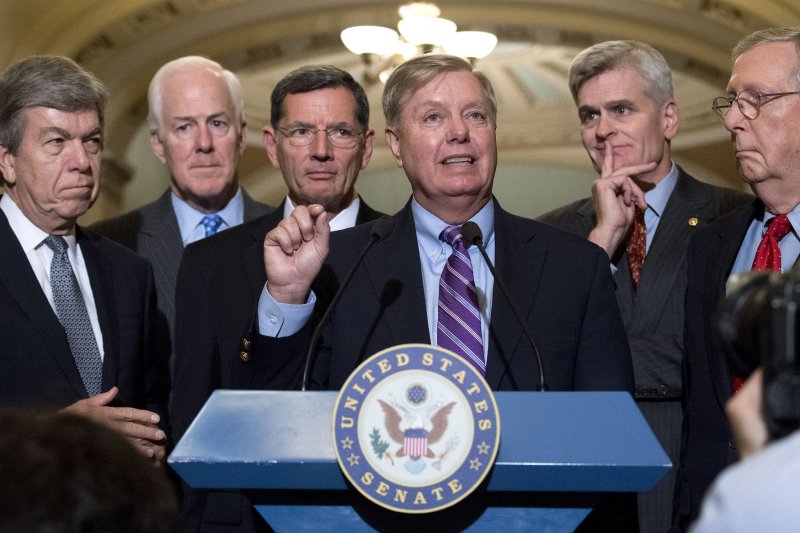Sen. Lindsey Graham, R-S.C., (C) speaks on a healthcare bill, joined by fellow Republican Senators, on Capitol Hill Tuesday. Photo by Kevin Dietsch/UPI |
License Photo
Sept. 20 (UPI) -- New Republican legislation to repeal the Affordable Care Act would cut funding to states by $215 billion over six years, a new analysis projected Wednesday.
Senate Majority Leader Mitch McConnell plans to bring legislation sponsored by Republican Sens. Lindsey Graham of South Carolina and Bill Cassidy of Louisiana "on the floor next week," McConnell spokesman Don Stewart said Wednesday. McConnell has until Sept. 30 for just 51 votes to pass the legislation under special procedural rules instead of 60.
Washington-based Avalere Health, a health policy consulting firm, would slash nearly three dozen states' federal funding that's earmarked for Medicaid and private insurance subsidies between 2020 and 2026.
The losses would total $4 trillion over a 20-year period, the report said.
"The Graham-Cassidy bill would significantly reduce funding to states over the long term, particularly for states that have already expanded Medicaid," said Caroline Pearson, senior vice president at Avalere. "States would have broad flexibility to shape their markets but would have less funding to subsidize coverage for low- and middle-income individuals."
In the analysis, 34 states and Washington, D.C., would lose funding -- more than $10 billion in seven of the states. The biggest losses would be seen in states like California and New York, which had the greatest gains expanding their Medicaid programs. Conversely, states with lower medical costs, skimpy Medicaid benefits and no expansion, would do better. Texas stands to gain the most -- $35 billion from 2020 through 2026.
"The bill creates a financial incentive for states to direct coverage to very low-income residents near or below the poverty line, potentially at the expense of lower-middle-income individuals who currently receive exchange subsidies," said Chris Sloan, senior manager at Avalere.
The new plan, which aims to take effect in 2020, would eliminate insurance subsidies, mandates for individual Americans and large businesses, and health benefit requirements in ACA marketplaces. Instead, block grants would be given to states with the freedom to decide how to spend the money.
Several governors urged Senate leaders in a letter Tuesday "not to consider" the Graham-Cassidy bill. All four Republican governors who signed the letter come from states that expanded their Medicaid programs -- John Kasich of Ohio, Brian Sandoval of Nevada, Charlie Baker of Massachusetts and Phil Scott of Vermont -- plus the one independent, Bill Walker of Alaska.
Andrew Dreyfus, president and chief executive of Blue Cross Blue Shield of Massachusetts, said in a statement Wednesday that his company has "serious concerns" about the bill's Medicaid cuts and "provisions that would allow states to remove protections for those with pre-existing conditions."
The bill gives states the option to waive the ACA's market rules, including what qualifies as essential health benefits under pre-existing conditions and not charging different premiums based on age.
In July, the Senate was unable to pass repeal legislation in which 16 million more people would be uninsured over 10 years, according to a Congressional Budget Office analysis. This bill mainly stripped the individual mandate, which penalizes uninsured who don't purchase coverage.
The CBO has not analyzed the Graham-Cassidy plan yet and the Avalere report doesn't list the number of people who would lose coverage. It did note that the bill "creates a funding cliff after 2026 when funding needs to be re-appropriated."'
Republicans need all but three of their 52 senators to approve the legislation, as all Democrats oppose repealing the ACA, also known as Obamacare.
Two Republican senators -- Rand Paul of Kentucky and Susan Collins of Maine -- have said they oppose the new bill.
Voting against the previous legislation were Collins, Arizona Sen. John McCain and Alaska Sen. Lisa Murkowski.
Cassidy and Graham met Wednesday with Murkowski and fellow Alaskan senator, Dan Sullivan, who have not yet said whether they support the plan. McCain is a good friend of Graham but has criticized Republicans for ditching "regular order," and not conducting hearings or consulting with Democrats.















